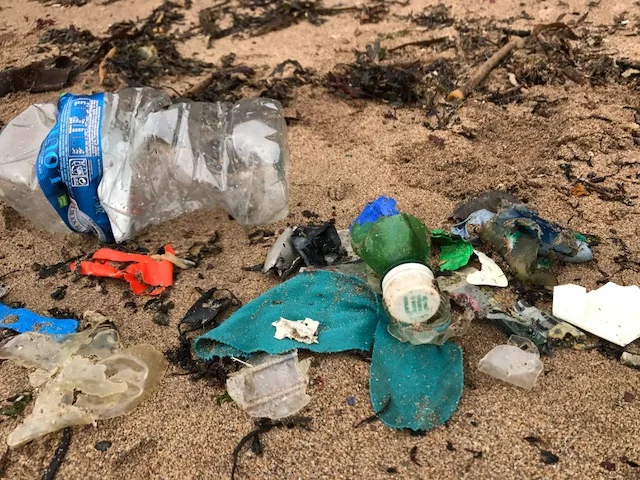The problem with plastic
Rachel Hearne
I’ve always thought of myself as being fairly environmentally responsible. I recycle, use a food waste bin, cycle to work, use my eco-friendly water bottle when I can instead of buying plastic bottles, and 2 years ago went vegan, in part due to the impact of animal agriculture on the environment.
But just last week, at an event we hosted, we heard from Sara Vaughan – a consultant, ‘change maker’ and former VP of Sustainable Business at Unilever, whose latest project A Plastic Planet seeks to eliminate plastic from food and drink packaging in supermarkets. Sara had some pretty eye opening stats about the scale of the world’s plastic problem.
The facts
- By 2025 there will be 1 ton of plastic for every 3 tonnes of fish in the sea.
- By 2050 there will be more plastic than fish in the sea.
- A third of fish caught off the coast of South West England contain traces of plastic.
- 100% of oysters & moules from Northern France contain plastic.
- Just last month DEFRA (Department for Environment, Food & Rural Affairs) reported a massive 158% increase in marine litter this year around the British Isles. Single-use plastic such as bottles and bags accounts for almost all of this.
And perhaps what I found most surprising:
- Only 14% of the plastic we throw away is recycled in this country. And that includes what you put in your recycling bin.
Plastic rubbish collected from what first looks like pristine rock pools in Dunmore East, Ireland.
Credit: A Plastic Planet
So even when you think you’re doing your bit by recycling, most of what you’re getting rid of will actually end up in landfill, or get burnt, which produces highly toxic emissions.
The reason for this? Quite simply, plastic, especially plastic used in food and drink packaging gets dirty and contaminated, making it difficult to reclaim. And it’s by far cheaper to make virgin plastic than to recycle it.
Sara and her colleagues at A Plastic Planet are focusing their efforts on food and drink. 40% of all plastic is used for packaging, and half of this is used for food and drink. A lot of this is single use plastic, which shockingly, has an average shelf life of 12 minutes, but will exist on our planet forever. We are also just starting to learn about the horrific health implications that result from the chemicals in plastic packaging seeping into our food. These same chemicals can actually change the sex of fish. It doesn’t bear thinking about what they can do to us.
What can be done?
It’s hard to know where to start when faced with a problem like this. Since hearing Sara speak I’ve noticed how hard it is to buy something that’s not plastic wrapped. Turns out cardboard takeaway coffee cups are plastic lined and therefore completely unrecyclable. And in most supermarkets, it can be almost impossible to buy fruit and vegetables that aren’t pre-packaged in cellophane - the worse kind of plastic according to Sara, who says that the more flexible the plastic, the more chemicals it contains (it’s also completely unrecyclable). Other people of the internet who have tried to give up single use plastics for 30 days encountered the same issues.
The answer is regulation. Even with the best intentions, there’s little consumers can do if we’re hard pushed to find a product that isn’t packaged in plastic, and if most of what we recycle doesn’t actually get recycled. In this respect, the developing world is further ahead than we are. Sara pointed out that ten African countries have banned the plastic bag, and Delhi has banned single-use plastic altogether. A Plastic Planet is working with politicians, scientists, charities, NGOs, packaging manufacturers, consumer goods producers, and supermarkets themselves to deliver the campaign’s aim of creating a plastic free aisle. And there was some encouraging news – apparently a soon-to-be-revealed European supermarket has agreed to pilot a fully plastic free supermarket.
Top 5 things you can do (today!)
While we wait for things to shift in UK supermarkets too (and if you want to help A Plastic Planet with their mission you can get involved), there are a few easy things you start doing today:
- Use a reusable coffee cup. And if you do have to use a takeaway cup, try not to use the lid. It is not good for you and it is totally un-recyclable.
- Don’t cook ready meals or boil-in-bag in plastic. Decant them into oven dishes. Heat + most plastics = not healthy.
- Buy cans versus plastic bottles or try to carry a reusable bottle. And say no to plastic straws.
- Find alternatives to plastic applicator tampons. We women don’t want to be inserting and flushing away plastic.
- Avoid using cling film. Use waxed or greaseproof paper, or pop a plate over bowls instead. The more flexible the plastic, the more chemicals it contains.


